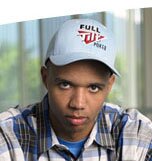Chris Ferguson
February 27, 2006
There's no question that aggressive poker is winning poker. If the world's top players have only one thing in common, it's that they take control of the hands they play with bets and raises. Usually, among the world's poker elite, calling is the least attractive option.
For this tip, however, I thought I'd talk about a couple of instances when playing passively - just checking and calling bets - may be the preferred option.
Top Pair, Favorable Board
Say I'm in the early stages of a tournament and I have an ample stack. I find Ace-Jack in middle position and raise to three times the big blind. A player in late position, who I know to be solid but fairly aggressive, calls my raise, and everyone else folds. The flop comes As-4d-8h. I've got top-pair, with a decent kicker.
First, I want to think about the hands my opponent might hold. It's likely he called my raise with an Ace or a pocket pair, maybe in the range of 66-99. He may have also called with two high cards like KQ, KJ or QJ.
In this situation, I'm likely very far ahead or hopelessly behind if my opponent hit a set or has a bigger Ace. If he's got an Ace with a worse kicker, he's drawing to only three outs. If he's got a pocket pair like 77, he has only two outs. With just two face cards, he's almost drawing dead. And on this board (As-4d-8h), I don't need to be especially worried about straight or flush draws. Because of this, I don't mind giving my opponent a free card.
If I bet my top pair and my opponent holds a pocket pair, he's likely to fold, and I'll have failed to get any additional value out of my hand. If I check, however, I give this player the chance to bluff or bet his lesser Ace, and I can then call.
Ideally, I want to get one decent-sized bet in over the course of this hand and by checking, I prevent my opponent from giving me more action than my hand can handle.
Say the turn is 3c. The situation hasn't changed much. I'm still either way ahead or very far behind. I can check again, and allow my opponent to bluff.
On most river cards, if we have checked the hand down, I will generally bet. If we've put one bet in, I'll probably check-call, and if we've put in two, I'll likely check and fold. Playing the hand in this manner provides three advantages. It allows me to get good value out of a strong hand, and it also keeps me from losing more than I need to against a hand that has mine beat without too much risk. Additionally, playing this way gives my opponent the opportunity to bluff, which is the only way to get any money out of him if he holds a hand like QJ.
Decent Hand, Scary Board
Here's another early tournament situation where my opponents and I have relatively deep stacks. Say I'm holding pocket 8s in middle position and a player has raised pre-flop from early position. I call the raise and a player in late position calls as well. The three of us see a flop of Jd-Jc-4s.
There's a decent chance that my 8s are good, but I want to proceed cautiously, as either of the other players in the hand could hold a Jack.
Say that all three of us check this flop. I really haven't learned too much, because someone could be slow playing trip Jacks.
The turn comes 6h. This doesn't look like it would have helped anyone's hand, but the pre-flop raiser bets from early position. This is a spot where I'd likely just call. There are a couple of advantages to just calling in this situation. First, it doesn't over-commit me to the pot. If the player in late position raises, I can muck having lost a minimum number of chips. Secondly, the call is going to look very scary to my opponents. They might be thinking that I'm the one slow playing trip Jacks. So, even if the early position player holds a higher pocket pair, he's likely to check on the river no matter what card hits. At that point, I can show down my 8s and see if they are in fact the best hand.
The problem with this play relative to the last one is that I am probably giving my opponent six outs to catch up and beat my hand if he has two over-cards, as opposed to two or three outs in the previous example.
I don't play passively often, but under the right circumstances, just calling bets can provide good value while minimizing risk.
For another perspective on passive play, be sure to read the lesson entitled In Defense of the Call by Gavin Smith.
Chris Ferguson
|



